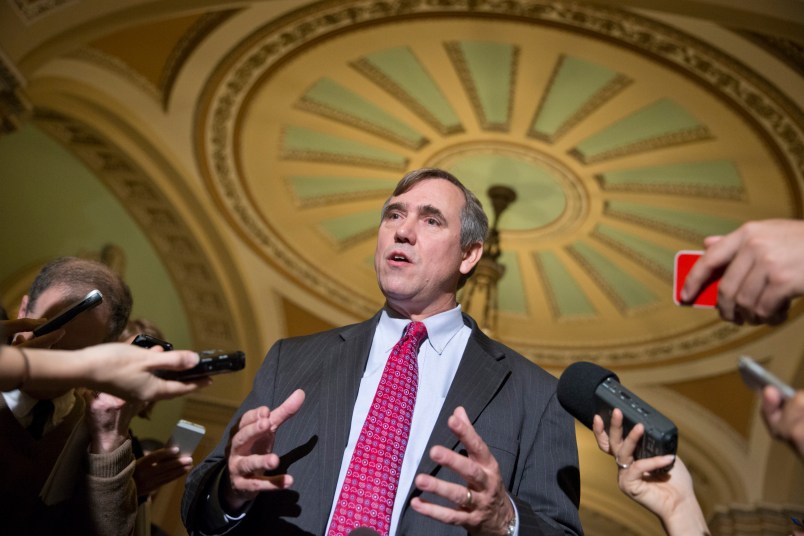Nobody in the U.S. Senate has been more a more outspoken advocate for filibuster reform than Jeff Merkley. The Oregon Democrat was first elected senator on the same night that Barack Obama was first elected president, and quickly witnessed the chamber “go from being a cooling saucer to being a deep-freeze,” as he puts it, with unprecedented gridlock.
He first began working to reform the tool in 2010, circulating draft proposals and picking up co-sponsors. The following year, he introduced his “talking filibuster” bill with Sen. Tom Udall (D-NM), requiring a minority to hold the floor and speak for the duration of its obstruction. It didn’t go anywhere. Threats and warnings by Democratic leaders — in 2011, early 2013 and this summer — ended in handshake deals with Republicans that continued business as usual.
On Thursday, Merkley’s obsessive efforts to lay the groundwork for a rules change finally paid off when Senate Majority Leader Harry Reid pulled the nuclear trigger and, backed by 51 other Democrats, ended the filibuster for executive branch nominations and non-Supreme Court judges. While some of his own party’s leaders cautioned that it was a “sad” day and not a time for celebration, Merkley was openly thrilled.
“This is a great day for the U.S. Senate,” the senator told TPM in an interview in the Capitol. “It’s a great day for the American people. It is a big deal. The Senate’s been deeply broken.”
Merkley told TPM he “absolutely” wants to go further and enact his “talking filibuster” proposal to change the rules of the Senate for passing legislation. It would end the first of two opportunities for a minority to block bills, by scrapping the 60-vote threshold for the “motion to proceed” and, on final passage, require 41 senators to hold the floor and take turns speaking ceaselessly until one side gives in.
“If 41 say they want more debate, there has to actually be debate,” he said. “There has to be at least one of them on the floor speaking to the bill. It’s only reasonable to people that if you vote for more debate, there has to be something to say, and if you don’t have something to say, then we should get to a final vote. That has been the foundation of the understanding about the filibuster throughout our history, and that’s what we need to restore.”
The Oregon senator’s tactics in whipping up support for reform have, at times, gotten him in trouble with Democratic colleagues, including leadership. Early this year, before a filibuster standoff ended in a bipartisan agreement to largely preserve the status quo, Merkley reportedly started naming names of skittish Democrats to outside pro-reform activists, which was seen internally as a breach of trust. He was taken to task in a Democratic caucus meeting by a furious Harry Reid and in the press by aggravated party aides.
In the interview with TPM, Merkley flatly dismissed claims that the rule change would spell the end of the Senate — what some call the “world’s greatest deliberative body” — as we know it.
“They’re simply wrong,” he insists, blaming the escalated use of the filibuster for bringing about the “destruction of the Senate that I saw in the 1970s and 1980s when I first came here as an intern and worked here on Capitol Hill. What this action today was all about is restoring the role of the Senate as a functioning body.”
He said the filibuster rules have come apart in the last 15 years, blaming both parties for abusing it. Merkley defended his intent to go further on rules reform to liberal skeptics, most notably reproductive rights advocates who worry about what a future Republican president and Senate majority might do with 51 votes to weaken abortion rights.
“The proposals that I’m making on legislation leave the filibuster in place,” the senator said. “If you want to block something, you just have to spend the time and energy on the floor and make your case so you don’t have this invisible blockade.”
TPM asked Merkley about Senate Republican Leader Mitch McConnell’s threat that if Democrats triggered the nuclear option for nominations, he as majority leader would go nuclear and end all filibusters, including for Supreme Court nominees and legislation.
The Democrat chuckled and smiled.
“Well let’s be clear. The Republicans have already demonstrated that they will change the rules any time there is a Democratic blockade of what they wanted to accomplish,” Merkley said, invoking the 2005 standoff when a Democratic Senate minority filibustered President George W. Bush-nominated judges they decried as extreme or unqualified. Republicans threatened to go nuclear, and Democrats surrendered and let the judges through.
His argument to reform skeptics — a view that’s shared by many Democrats, including leadership — is that McConnell won’t hesitate to end the filibuster if a Democratic minority were to block top GOP priorities. “Absolutely,” he said. “That was demonstrated in 2005. That was the principle. You block us? We’ll change the rules.”






